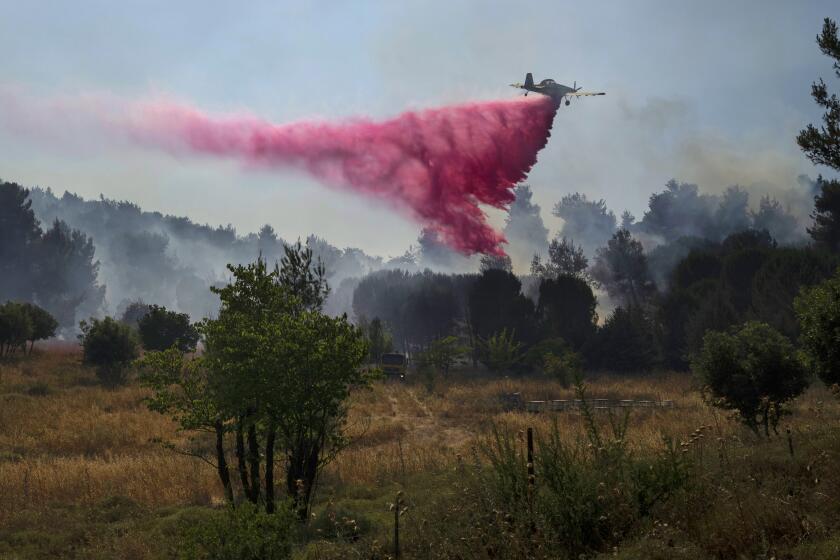Iran to hold runoff election between reformist and hard-liner after low-turnout vote

- Share via
DUBAI — Iran will hold a runoff presidential election pitting a little-known reformist against a hard-line former nuclear negotiator after results released Saturday showed the lowest-ever poll turnout in the Islamic Republic’s history.
The race is to replace the late hard-line Iranian President Ebrahim Raisi, who died last month in a helicopter crash.
More than 60% of voters cast no ballot in the race that saw reformist Masoud Pezeshkian best Saeed Jalili, who competed alongside two other hard-liners. But Pezeshkian did not get the more than 50% of votes cast that is required by Iranian law to win outright.
With Jalili now alone in facing the cardiac surgeon, Pezeshkian’s campaign would need to draw voters to the July 5 runoff in an election they’ve otherwise not taken part in as public anger hardens following years of Iran facing economic hardships and mass protests under its Shiite theocracy.
“Let’s look at it as a protest in its own right: A very widespread choice to reject what’s on offer — both the candidates and the system,” said Sanam Vakil, the director of Chatham House’s Middle East and North Africa program. “That tells us a lot about public opinion and apathy, frustration. It sort of brings it all together.”
Of the 24.5 million votes cast in Friday’s election, Pezeshkian got 10.4 million while Jalili received 9.4 million, election spokesman Mohsen Eslami announced. Parliament speaker Mohammad Bagher Qalibaf got 3.3 million, while Shiite cleric Mostafa Pourmohammadi had over 206,000 votes.
As has been the case since the 1979 Islamic Revolution, women and those calling for radical change were barred from running. The voting has had no oversight from internationally recognized monitors.
There were signs of the wider disenchantment of the public with the vote after calls for a boycott. More than 1 million votes were voided, according to the results, typically a sign of people feeling obligated to cast a ballot but not wanting to select any of the candidates. The overall turnout was 39.9%, according to the results.
Jalili, once described by CIA director Bill Burns as “stupefyingly opaque” in negotiations, likely would have won outright had the three hard-liners not split Friday’s vote. Jalili is known as the “Living Martyr” after losing a leg in the 1980s Iran-Iraq war and is famous among Western diplomats for his haranguing lectures and hard-line stances.
Qalibaf, a former general in Iran’s paramilitary Revolutionary Guard and head of Iran’s police, quickly endorsed Jalili and criticized Pezeshkian for allying himself with former President Hassan Rouhani and his former foreign minister, Mohammad Javad Zarif. The two reached Iran’s 2015 nuclear deal with world powers, which later collapsed after then-President Trump unilaterally withdrew from the accord.
Now the question becomes whether Pezeshkian will be able to draw voters into his campaign. On election day, he offered comments on outreach to the West — even after being targeted by a veiled warning from Supreme Leader Ayatollah Ali Khamenei.
The escalating war between Hezbollah and Israel — coupled with scorching heat — has sparked fires that are destroying forests and farmland.
Raisi, 63, died in the May 19 helicopter crash, which also killed the country’s foreign minister and others. He was seen as a protégé of Khamenei and a potential successor.
The runoff election comes as wider tensions have gripped the Middle East over the Israel-Hamas war in the Gaza Strip. In April, Iran launched its first-ever direct attack on Israel. Militia groups that Tehran arms in the region — such as the Lebanese Hezbollah and Yemen’s Houthi rebels — are engaged in the fighting and have escalated their attacks.
Meanwhile, the Islamic Republic continues to enrich uranium at near weapons-grade levels and maintains a stockpile large enough to build — should it choose to do so — several nuclear weapons.
Vakil said that “it’s going to rest on if the general public, that 60% who stayed home, are going to come out and protect themselves from those hard-line views” Jalili holds. “That’s what next Friday is going to be about.”
Gambrell reported from Dubai, Vahdat from Tehran. Nasser Karimi in Tehran contributed to this report.
More to Read
Sign up for Essential California
The most important California stories and recommendations in your inbox every morning.
You may occasionally receive promotional content from the Los Angeles Times.











